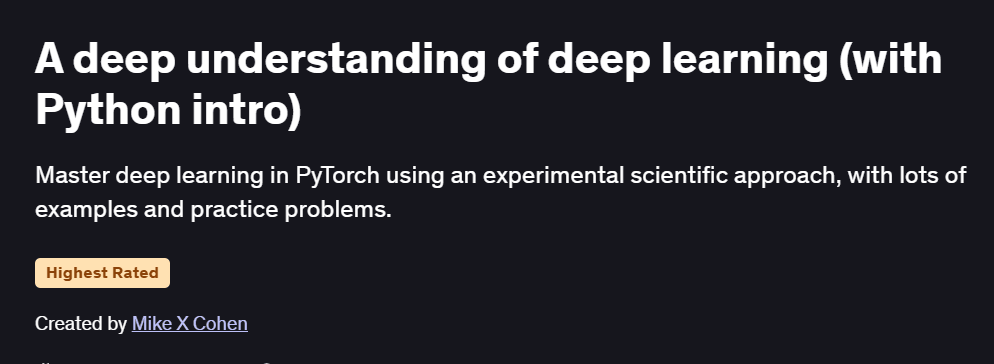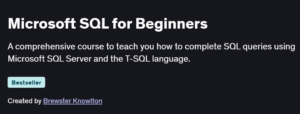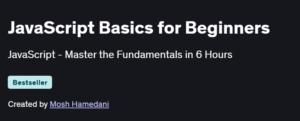What will you learn in A deep understanding of deep learning (with Python intro) Course
Grasp the theory and math behind deep learning: from gradient descent to regularization, weight initialization, transfer learning, and autoencoders.
Build and analyze models like feedforward neural networks, CNNs, RNNs, and GANs using PyTorch.
Learn Python from scratch if needed, with an extensive appendix (8+ hours) covering basics for beginners.
Use Google Colab (cloud-based notebooks with free GPU) for all coding and experimentation.
Improve models via hyperparameter tuning, dropout, batch normalization, and understanding why neural networks work or fail. ([turn0search0])
Program Overview
Module 1: Deep Learning Fundamentals & Math Theory ⏳ ~10–12 hours
Topics: Core calculus and optimization (gradient descent, loss functions), layer activations, network architectures, regularization, weight initialization.
Hands‑on: Python and math walkthroughs in Colab, code-based visualization of training curves and parameter effects.
Module 2: Building Neural Architectures in PyTorch
⏳ ~8–10 hours
Topics: Construct neural networks using PyTorch; build CNNs, RNNs, and generative models including autoencoders and basic GANs.
Hands‑on: Implement models from scratch, visualize filters, generate sample outputs, and experiment with transfer learning.
Module 3: Advanced Optimization, Regularization & Practical Performance
⏳ ~5 hours
Topics: Learning rate schedules, batch norm, dropout, optimizer choices, parameter tuning, and overfitting avoidance strategies.
Hands‑on: Tune and retrain models with different settings; evaluate model behavior and runtime efficiency.
Module 4: Python Refresher & Supporting Tools
⏳ ~8 hours
Topics: Python essentials for beginners: data structures, functions, NumPy, plotting, Colab environment setup.
Hands‑on: Guided coding exercises to prep for deep learning modules.
Get certificate
Job Outlook
Equips learners for ML engineer roles, deep learning practitioner roles, or researcher-adjacent jobs demanding strong model intuition.
Applicable industries include AI startups, autonomous systems, medical imaging, fintech predictive modeling, and research labs.
Knowledge of model internals and tuning makes you adept at roles beyond just implementation—ideal for driving new service ideas or interpreting model behavior.
Salary potential: ML/AI engineers with deep learning specialization often earn ₹15–30 LPA in India and $110K–$160K+ in the U.S.
Specification: A deep understanding of deep learning (with Python intro)
|
FAQs
- No prior deep learning experience needed.
- Python basics included (~8 hours) for absolute beginners.
- Covers fundamental math, gradient descent, and model intuition.
- Hands-on labs use Google Colab for accessible GPU-based coding.
- Ideal for learners aiming to understand both theory and implementation.
- Build and train neural networks using PyTorch.
- Hands-on implementation of CNNs, RNNs, autoencoders, and GANs.
- Visualize training curves and filter outputs for better intuition.
- Learn hyperparameter tuning, batch normalization, and dropout.
- Focus on understanding why models work or fail in practice.
- Prepares for ML/AI Engineer, Deep Learning Specialist, or Research roles.
- Applicable in AI startups, autonomous systems, fintech, and medical imaging.
- Skills emphasize model intuition, tuning, and evaluation.
- Salary potential: ₹15–30 LPA in India, $110K–$160K+ in the U.S.
- Strengthens capability beyond implementation to designing and interpreting models.
- No single capstone project included.
- Hands-on labs implement multiple deep learning models from scratch.
- Practice with data preprocessing, model evaluation, and tuning.
- Exercises reinforce conceptual understanding with practical application.
- Encourages independent experimentation for portfolio building.
- Total course duration: ~31–35 hours across four modules.
- Modules cover theory, PyTorch implementation, optimization, and Python refresher.
- Flexible pacing allows completion alongside work or other courses.
- Hands-on labs may require extra practice for mastery.
- Most learners complete it in 3–6 weeks with consistent study.





